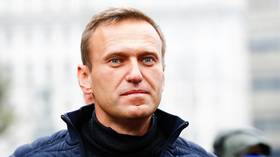Russian opposition figure Navalny claims he spoke to ‘FSB officer’ who confessed to being part of alleged poison plot last summer

Last week Alexey Navalny named eight FSB agents he believes are responsible for his alleged poisoning last August. Now, he has released a video showing a conversation he conducted with one of the men previously singled out.
In the video, published to Navalny's YouTube channel on Monday afternoon, the person on the other end of the phone – purported to be security officer Konstantin Kudryavtsev – admits to being part of an operation to poison and kill the opposition figure. Last week, the anti-corruption activist named Kudryavtsev, along with seven others, as supposedly taking part in a mission to murder him using the lethal nerve agent Novichok.
Navalny insists the operation was ordered by Vladimir Putin, an assertion which the Russian president has flatly denied. Last week, during his annual end-of-year press conference, Putin also dismissed suggestions that the FSB (Federal Security Service) had tried to kill the opposition activist, noting that if Russian security services wanted to assassinate him they would have done so successfully. The president also claimed that Navalny is supported in his work by US intelligence services.
The Kremlin later said that it was standard practice for the FSB to put individuals it suspected of being in contact with foreign spy agencies under surveillance.
Also on rt.com West’s cultivation of Navalny as ‘Russian opposition leader’ plays into Kremlin hands by making him politically irrelevant at homeNavalny's phone call features ‘Kudryavtsev’ offering the opinion that the Moscow protest leader may have died if his plane hadn't quickly made an emergency landing in Omsk and local medics weren't so swift to administer an antidote. The activist initially fell ill while on a flight from Tomsk, another Siberian city, to Moscow.
The opposition figure explained that the conversation, conducted alongside a representative of the US and British state-funded Bellingcat investigative journalism and open-source intelligence collective, took place several hours before he publicly revealed the eight men he holds responsible for the alleged murder attempt. According to Navalny, his team also tried to call the other seven but they refused to talk.
In order to speak to ‘Kudryavtsev’, the activist posed as ‘Maxim Ustinov’, a fictional personal assistant of Nikolai Patrushev, the chairman of Russia's Security Council. Under the pretense of conducting interviews on the failure of the poisoning mission, Navalny managed to get ‘Kudryavtsev’ to open up about his role in the operation.
During the 49-minute call, ‘Kudryavtsev’ repeatedly expressed concerns that it was being conducted over an unsecured line, but nevertheless appears to admit that the FSB attempted to kill Navalny, and not just intimidate him. However, he notes that he was not present on the day Navalny fell ill, and was only privy to a small part of the operation's details.
Also on rt.com What have they got to hide? While trying to dismiss suggestions of ties to UK spooks, Bellingcat founder again lies about finances‘Kudryavtsev’ also talks at length about efforts apparently made by the FSB to cleanse Navalny's clothes of any traces of the nerve agent, in particular his underwear, which he claims was the location where the toxin was applied. He said he went to Omsk on August 25, five days after Navalny was admitted to hospital, in order to deal with the activist’s personal effects. In his opinion, as expressed in the phone call, the mission to kill Navalny failed due to the quick emergency landing and the excellent response of medics on the ground.
Kudryavtsev is alleged by Bellingcat - and its partners CNN, Der Spiegel and The Insider - to be an employee of the FSB's Criminalistics Institute, and a trained chemical-weapons specialist.
How Bellingcat's team got hold of the data in the first place has been the subject of much speculation in Moscow. A former member of the Russian parliament, Sergey Markov, has previously claimed that “Bellingcat looks very much like the information warfare department of MI6 to me.”
Bellingcat denies that it collaborates directly with Western intelligence and has published an explanation on its website of how it carried out its investigation. It also argues that many of its contributors are volunteers.
However, last week, Michael Schwirtz, a New York Times journalist, revealed how “a senior German security official says the report [on Navalny's poisoning] aligns with what CIA and MI6 quietly provided the German government months ago.”
Think your friends would be interested? Share this story!













